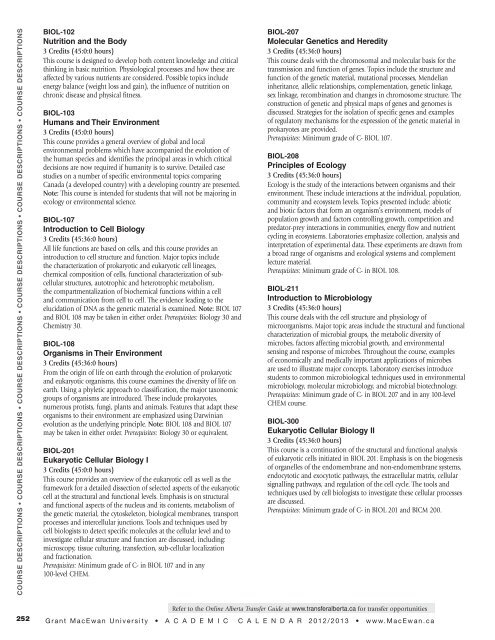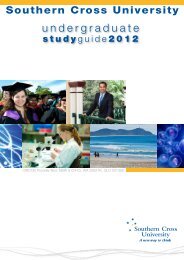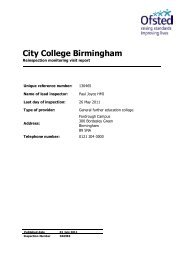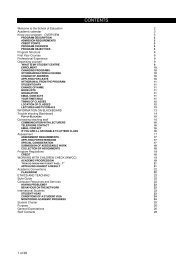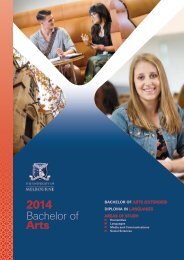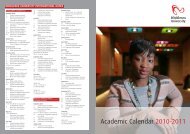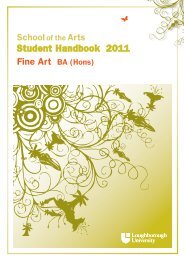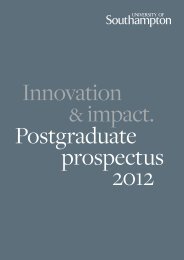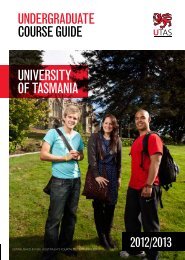Academic Calendar 2012/2013
Academic Calendar 2012/2013
Academic Calendar 2012/2013
Create successful ePaper yourself
Turn your PDF publications into a flip-book with our unique Google optimized e-Paper software.
course Descriptions • course Descriptions • course Descriptions • course Descriptions • course Descriptions • course DescriptionsBIOL-102Nutrition and the Body3 Credits (45:0:0 hours)This course is designed to develop both content knowledge and criticalthinking in basic nutrition. Physiological processes and how these areaffected by various nutrients are considered. Possible topics includeenergy balance (weight loss and gain), the influence of nutrition onchronic disease and physical fitness.BIOL-103Humans and Their Environment3 Credits (45:0:0 hours)This course provides a general overview of global and localenvironmental problems which have accompanied the evolution ofthe human species and identifies the principal areas in which criticaldecisions are now required if humanity is to survive. Detailed casestudies on a number of specific environmental topics comparingCanada (a developed country) with a developing country are presented.Note: This course is intended for students that will not be majoring inecology or environmental science.BIOL-107Introduction to Cell Biology3 Credits (45:36:0 hours)All life functions are based on cells, and this course provides anintroduction to cell structure and function. Major topics includethe characterization of prokaryotic and eukaryotic cell lineages,chemical composition of cells, functional characterization of subcellularstructures, autotrophic and heterotrophic metabolism,the compartmentalization of biochemical functions within a celland communication from cell to cell. The evidence leading to theelucidation of DNA as the genetic material is examined. Note: BIOL 107and BIOL 108 may be taken in either order. Prerequisites: Biology 30 andChemistry 30.BIOL-108Organisms in Their Environment3 Credits (45:36:0 hours)From the origin of life on earth through the evolution of prokaryoticand eukaryotic organisms, this course examines the diversity of life onearth. Using a phyletic approach to classification, the major taxonomicgroups of organisms are introduced. These include prokaryotes,numerous protists, fungi, plants and animals. Features that adapt theseorganisms to their environment are emphasized using Darwinianevolution as the underlying principle. Note: BIOL 108 and BIOL 107may be taken in either order. Prerequisites: Biology 30 or equivalent.BIOL-201Eukaryotic Cellular Biology I3 Credits (45:0:0 hours)This course provides an overview of the eukaryotic cell as well as theframework for a detailed dissection of selected aspects of the eukaryoticcell at the structural and functional levels. Emphasis is on structuraland functional aspects of the nucleus and its contents, metabolism ofthe genetic material, the cytoskeleton, biological membranes, transportprocesses and intercellular junctions. Tools and techniques used bycell biologists to detect specific molecules at the cellular level and toinvestigate cellular structure and function are discussed, including:microscopy, tissue culturing, transfection, sub-cellular localizationand fractionation.Prerequisites: Minimum grade of C- in BIOL 107 and in any100-level CHEM.BIOL-207Molecular Genetics and Heredity3 Credits (45:36:0 hours)This course deals with the chromosomal and molecular basis for thetransmission and function of genes. Topics include the structure andfunction of the genetic material, mutational processes, Mendelianinheritance, allelic relationships, complementation, genetic linkage,sex linkage, recombination and changes in chromosome structure. Theconstruction of genetic and physical maps of genes and genomes isdiscussed. Strategies for the isolation of specific genes and examplesof regulatory mechanisms for the expression of the genetic material inprokaryotes are provided.Prerequisites: Minimum grade of C- BIOL 107.BIOL-208Principles of Ecology3 Credits (45:36:0 hours)Ecology is the study of the interactions between organisms and theirenvironment. These include interactions at the individual, population,community and ecosystem levels. Topics presented include: abioticand biotic factors that form an organism’s environment, models ofpopulation growth and factors controlling growth, competition andpredator-prey interactions in communities, energy flow and nutrientcycling in ecosystems. Laboratories emphasize collection, analysis andinterpretation of experimental data. These experiments are drawn froma broad range of organisms and ecological systems and complementlecture material.Prerequisites: Minimum grade of C- in BIOL 108.BIOL-211Introduction to Microbiology3 Credits (45:36:0 hours)This course deals with the cell structure and physiology ofmicroorganisms. Major topic areas include the structural and functionalcharacterization of microbial groups, the metabolic diversity ofmicrobes, factors affecting microbial growth, and environmentalsensing and response of microbes. Throughout the course, examplesof economically and medically important applications of microbesare used to illustrate major concepts. Laboratory exercises introducestudents to common microbiological techniques used in environmentalmicrobiology, molecular microbiology, and microbial biotechnology.Prerequisites: Minimum grade of C- in BIOL 207 and in any 100-levelCHEM course.BIOL-300Eukaryotic Cellular Biology II3 Credits (45:36:0 hours)This course is a continuation of the structural and functional analysisof eukaryotic cells initiated in BIOL 201. Emphasis is on the biogenesisof organelles of the endomembrane and non-endomembrane systems,endocytotic and exocytotic pathways, the extracellular matrix, cellularsignalling pathways, and regulation of the cell cycle. The tools andtechniques used by cell biologists to investigate these cellular processesare discussed.Prerequisites: Minimum grade of C- in BIOL 201 and BICM 200.252Grant MacEwan University • A C A D E m I CRefer to the Online Alberta Transfer Guide at www.transferalberta.ca for transfer opportunitiesC A L E N D A R <strong>2012</strong>/<strong>2013</strong> • www.MacEwan.ca


